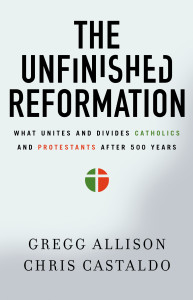 In our new book, The Unfinished Reformation: What Unites and Divides Catholics and Protestants after 500 Years, Gregg Allison and I seek to explain where the lines of agreement and difference fall between Catholics and Protestants. Of all the questions surrounding this subject, perhaps the most frequently asked is the following: “What is the fundamental difference? When you boil it down, where do Catholics and Protestants disagree?”
In our new book, The Unfinished Reformation: What Unites and Divides Catholics and Protestants after 500 Years, Gregg Allison and I seek to explain where the lines of agreement and difference fall between Catholics and Protestants. Of all the questions surrounding this subject, perhaps the most frequently asked is the following: “What is the fundamental difference? When you boil it down, where do Catholics and Protestants disagree?”
The simple answer is that we differ in our understanding of what properly constitutes Christian “authority,” particularly in reference to divine revelation and church tradition. But how do we differ, especially since Protestants tend to regard our traditions as possessing some degree of authority? The following analogy from the field of law may offer insight into the difference.
An Illustration from the Law Court
In U.S. Courts, lawyers and judges draw a distinction between “mandatory” authority and “persuasive” authority. Mandatory authority has a binding force upon those who are hearing a case. Persuasive authority, on the other hand, is not binding, but may instruct or guide a judge on how to properly rule in a case. It is imperative for the judge to follow all mandatory authority, but she is not bound to follow persuasive authority. Nevertheless, some forms of persuasive authority are instructive to a case, even to the degree that it might reflect poorly on the judge who disregards it.
Imagine there is a case before a state court judge for DuPage County in Wheaton. When an attorney presents his case, the judge will be bound to follow several mandatory sources: the U.S. Constitution, U.S. Code that may apply to the case, the Illinois Constitution, the Illinois Compiled Statutes, Illinois Supreme Court decisions, etc. If there is any law relating to the case that comes from any of these mandatory sources, the judge must follow that law.
Conversely, the judge may consider other cases handed down from courts outside the abovementioned chain of command. For example, let’s say that the case involves an Illinois statute that has never been interpreted by an Illinois state court. However, it turns out that Missouri has the same statute on its books, and it is known that Illinois modeled its law after the Missouri statute. Furthermore, the Missouri Supreme Court decision provides a detailed explanation of the proper application of the statute. A lawyer may in that instance present the case to the judge in Wheaton for guidance on how to rule on the case. The DuPage County judge would not be obligated to follow the Missouri Supreme Court decision, because it is not mandatory in Illinois. However, because this case came from a highest court in a state with the same statute, the judge would see this as a persuasive source and would be wise to look at that opinion. In the absence of any contrary authority, a prudent judge would almost certainly follow the Missouri case.[1]
The above analogy may help us to understand diverse ways in which Christians understand religious authority to function. It turns out that evangelical Protestants and Roman Catholics both uphold forms of authority that may be labeled mandatory and persuasive. For Catholics, mandatory authority is Sacred Scripture and Sacred Tradition—oral teaching, customs, institutions, and practices handed down through the generations. As stated in the Catholic Catechism, “Sacred Tradition and Sacred Scripture make up a single sacred deposit of the Word of God” (§97; DV 10). The third form of mandatory authority for Catholics is the so-called “Magisterium,” the teaching office of the church (the Pope and bishops in communion with him), which provides the authoritative interpretation of God’s Word, that is, it explains the meaning of Scripture and Tradition. The Magisterium also gives rise to teaching that is not mandatory.[2]
Protestants, by contrast, recognize the sixty-six books of our biblical canon as the sole mandatory authority. This is the idea of “sola scriptura” (Scripture alone)—that only Scripture is inspired without error and therefore mandatory (unlike the Catholic position which understands Scripture and also Tradition to be God’s Word). However, Protestants nevertheless recognize various forms of persuasive authority. For example, while the Nicene Creed and Symbol of Chalcedon may not be mandatory authority strictly speaking, they are tried-and-true statements of biblical truth that have been employed by the church universal since the fourth and fifth centuries and are therefore highly persuasive. This principle may be extended to a myriad of Christian traditions which are observed by most Protestants—everything from displaying a cross, lighting candles, and Sunday school classes—not to mention our confessions and catechisms.
Upholding our Traditions
I like how the late Harold O. J. Brown frames the challenge of maintaining biblically chaste conventions and customs in the church. Concerning the place of tradition he said, “If we consider faith as a climber trying to scale a snowy mountain peak, the one group [Roman Catholics] will have him so packed in flowing garments that he can hardly move, while the other [evangelical minimalists] might have him naked and barefoot—or to be more decent, in short and sneakers—and in imminent danger of hypothermia.”[3]
How then shall Protestants celebrate our church traditions without allowing them to eclipse the mandatory authority of the Bible? Here are three brief suggestions for those who identify with the Reformed tradition. First, let us remember that the Reformers and their ecclesial offspring have always maintained an appreciation for biblically rooted traditions, whether it is a study of the church fathers, early ecumenical councils, or various creedal statements.[4] So long as this persuasive authority elucidates biblical truth, we should joyfully employ it for the glory of God.
Second, let us not confuse “nuda scriptura” (literally “nude Scipture,”) with the doctrine of Scripture alone. The former removes all forms of tradition from the ongoing life of the church, insisting that the Bible functions as the only explicit source of authority for Christian faith and practice. In other words, it denies the category of persuasive authority altogether. Well intentioned as this approach may be, it turns out to be a reduction that obscures the meaning of God’s word by limiting its application, that is, by denying it the opportunity of speaking to the range of particular life situations that are not explicated by the biblical text.
Thirdly, let’s be cautious in how we uphold traditions, since we are vulnerable to human error. Made in God’s image, we have a natural desire to speak authoritatively, that is, to assert our traditions as mandatory. This, however, is a temptation we must resist. As Brown helpfully concludes: “We need to accept tradition in principle, and at the same time we need to be critical of traditions, both our own and those of others, lest they become the ‘commandments of men’ about which Jesus warns us.”[5]
FOOTNOTES:
[1] Our analogy begins to break down to the extent that you pit the statute of the Missouri Supreme Court against the mandatory authority of Illinois. The point of the analogy is simply that our evangelical tradition is a derivative or secondary authority, which is ministerial to the magisterial or ultimate authority of Scripture. Gregg Allison develops a similar notion in terms of “presumptive authority” in his article, “The Corpus Theologicum of the Church and Presumptive Authority,” in Derek J. Tidball, Brian S. Harris, and Jason S. Sexton, eds., Revisioning, Renewing, and Rediscovering the Triune Center: Essays in Honor of Stanley J. Grenz (Cascade, 2014), 319-339.
[2] Not all exercises of the Magisterium comprise mandatory authority. Extraordinary exercises of the Magisterium, such as ex cathedra papal teachings and definitions of ecumenical councils, are mandatory. Definitions by the so-called ordinary and universal magisterium would also qualify as mandatory authority. But much of the teaching of the magisterium, the “ordinary” magisterium of the Church, is closer to what we’re calling persuasive authority.
[3] Harold O.J. Brown. Reclaiming the Great Tradition. James S. Cutsinger, ed. (Downers Grove: InterVarsity Press, 1997), 77
[4] For example, the Belgic Confession (1561), The Heidelberg Confession (1563), the London Baptist Confession (1646) and The Westminster Confession of Faith (1647).
[5] Brown, Reclaiming the Great Tradition, 85.





